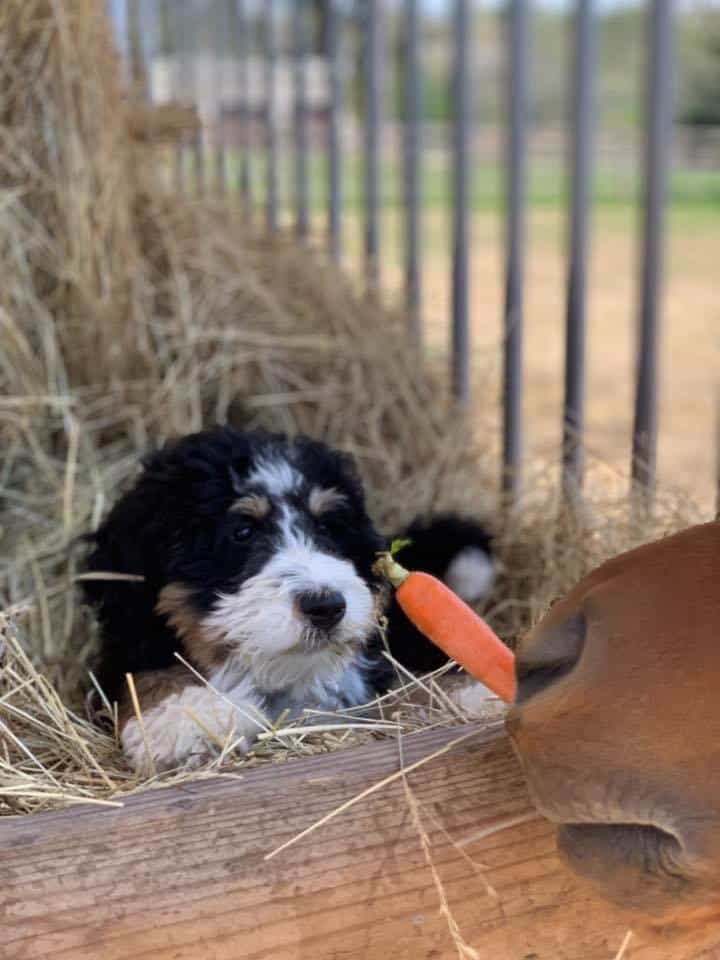
Just like with babies, your new puppy is going to need a balanced diet to help them grow big and strong! Picking out the diet your puppy will follow is a crucial part of the preparation process. Today we are going to discuss some dietary do’s and don’ts, plus address some myths commonly associated with dogs and their dinner.
The Decision
We all have preferences when it comes to food. Think about it, you probably reach for the same brand of potato chips every time you are in the grocery store, right? Just like you, your dog is going to have a preference when it comes to their diet. As your dog’s owner, it is up to you to provide them with a diet that not only suits their needs, but also their tastebuds.
But what dog food is best? There is a lot of room for personal preference here. We will start by saying we 100% believe all dietary changes, especially extreme ones, should be coordinated with your veterinary professional. As your puppy grows, their nutritional needs will change. In the earlier stages, your puppy is going to need lots of nutrients to help them grow up to be happy and healthy. Your puppy should be on a puppy food diet for at least six months. Smaller dogs may need to stay on puppy food until twelve months of age. Your vet will be able to help you decide when you can make that transition.

Growing up is hard work!
A Steady Transition
Whether you are switching your puppy to a different puppy food than what we have fed them or you are moving them to adult food, the process needs to be slow and steady. Quick dietary changes can be hard on your dog’s tummy and cause digestive upset. Severe digestive upset can lead to dehydration and can make your puppy very sick.
The best way to transition your puppy’s diet is in small increments. Begin by blending small amounts of the new food in with their current diet. As each day progresses, increase the amount of their new food. We recommend this process span out over seven days, so by the eighth day your puppy is eating solely your food of choice.
Kibbles or Cans?
You have two mainstream options when it comes to selecting the type of food your dog will eat: kibbles or cans. For the most part, this comes down to personal preference, but there are positives and negatives to each selection.
Kibbles tend to offer more diverse dietary options and are more affordable than canned dog food. Kibbles come in a variety of sizes, so be sure to buy one that is appropriate for your dog. Smaller dogs will have a very hard time chewing on large, dense kibbles, while bigger dogs will scarf down kibbles that are too small which poses a choke hazard. The reason why many people opt for canned food over kibbles is that their dog has a hard time chewing their food, but you can always moisten kibbles with water or chicken broth!
Canned food is more expensive than kibbles, but it is a lot easier for smaller dogs, young puppies or older dogs to consume. Canned food can upset sensitive stomachs, so it is important to make sure you are buying an appropriate blend for your dog’s stage of life. Larger dogs may require more than one can (as the can sizes are quite small) to have a full meal, making this the least cost-effective option of the two.
Snacks to Avoid
We love our dogs so much that it is easy to want to share our snacks with them. Not only can human foods be harmful to your four-legged friend, but they can lead to increased weight-gain which is hard on their bodies. Next time your pup gives you those sweet, begging eyes as you munch on your snacks, consider these hazards:
- Choke Hazards: Rib bones splinter and can become lodged in the esophagus, bread expands when moist, candy, fruits, etc.
- Toxic Foods: Chocolate, onions/garlic, nuts, grapes, cherries and candy can all be toxic to your dog!
- Other Dangers: Salt can lead to seizures, coffee can increase heart rate resulting in seizures, alcohol can lead to alcohol poisoning, and dairy as most dogs are lactose intolerant!

“Hey horsey! Share that carrot with me!”
In short, make sure you are picking a food that is full of the nutrients your growing dog needs. Make sure the food you decide to feed is easily accessible for those last-minute, late-night dog food runs! And try to avoid sharing snacks with your pooch, as many human foods can be dangerous for your pooch.
